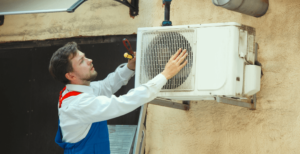HVAC 101: Basic Maintenance Guide To Homeowners

HVAC maintenance is an essential factor in ensuring the quality of an HVAC system. It includes inspecting the components of the systems on a monthly, seasonal, or yearly basis. Proper maintenance will keep the system functional and help increase the HVAC lifespan.
A properly maintained system will have minimal breakdowns, which will reduce the requirement for and cost of any unwanted repairs.
Why Is HVAC Maintenance Critical?
If you want your HVAC system to work correctly throughout the years, make sure to have a yearly tune-up. Ignoring it can seriously risk the lifespan of the system. Continue reading to read more about the importance of HVAC tune-ups:
1. Risk Of Breakdown Is Potentially Decreased
The HVAC systems are most likely to break down if they are not correctly maintained and overused. But, when you choose annual tune-ups, you can ensure that the system functions properly. An inefficient system will need to work harder to keep the home cold or warm, making it prone to regular breakdowns.
2. Keeps The Air Clean
The professionals will always make sure to safely and correctly do the tune-up. They will start by cleaning and dusting the unit, as having debris in and around the system can make it harder for the system to work properly. Doing so might help decrease the energy bill.
3. Deduction In The Energy Bill
Generally, the HVAC system can contribute to 40-50% of energy in a home. An unclean system is a waste of energy and can even increase the energy bill. But, regular tune-ups will save you from paying that extra cost and even improve the heater or air conditioner’s efficiency.
4. Extended Life of the System
Regular tune-ups contribute to the extended life of the system. In the end, you will be more comfortable and also be able to save more money. So, investing in a tune-up is essential to get the most out of your HVAC system.
Common HVAC Problems Due To Non-Maintenance
Most of the HVAC Issues can be avoided with regular preventive calls. It is clever to get your system annually checked to save your system from sudden breakdown. Here are some of the most common HVAC problems due to non-maintenance.
1. The Energy Bill Is Rising
A good indicator that your HVAC system is damaged is the increase in your energy bills. However, in some cases, it can be because of the increased fuel prices, but there are chances that your heating and cooling system might have some problems.HVAC systems older than 10 or 15 years won’t remain as efficient as the new ones.
2. There Are Unusual Noises Coming From Your System
Banging and rattling noises aren’t normal, and these noises usually come when the unit is deteriorating or because of loose parts. If there are loud and frequent noises from your system, you should talk to a professional. They will help you decide whether to choose an HVAC system repair or replacement.
3. The Circuit Breaker Is Regularly Tripping
If the circuit breaker is tripping constantly, it is a clear sign that you require a new HVAC unit for your place. While you could select to get it repaired, it is highly unlikely that they will work in the long run.
4. The Home’s Temperature Remains Uneven or Is Inconsistent
Do you feel that your system is not cooling or heating the home enough? It is a sign that your HVAC system is not working properly. Minor repairs might not be the solution to every system. So, if you have to regularly call the technicians for repairs, it is time to invest in a new unit.
Uneven heating or cooling can signify that your HVAC system is too small or even large for your place. An improperly sized HVAC system will decrease the unit’s lifespan. In this case, you may have to invest in a new unit sooner than expected.
5. Your HVAC Unit Requires Constant Repairs
If you need to get constant repairs for your HVAC system, it is time to invest in a new one. Frequent repairs are a sign that your unit will wear out and stop functioning soon.
Consulting with an HVAC expert will help you make the right decision. The service technicians will diagnose the issue with the unit.
HVAC Maintenance Checklist
These HVAC preventative maintenance checklists tasks are required to be performed before spring/summer:
- Cleaning or replacing of filters
- Cleaning of condenser and evaporator coils
- Cleaning of drain lines
- Clearing off the drain pans of any standing water to avoid overflows
- Replacing the worn pulleys and belts
- Inspecting of ducts for mold, debris, or dust
- Observing the humidity levels
- Checking the refrigerant charges, electrical system and connections, fan motor, blowers, and blades to ensure proper airflow
- Lubricating of motor bearings and moving parts
- Inspecting the cabinet for leaks and checking the cabinet door for proper closure
- Checking and cleaning the debris around the unit
These HVAC maintenance steps need to be followed by your HVAC service company ahead of the fall/winter season:
- Replacing the filters on heating equipment
- Inspecting ignition burner assembly
- Examining the heat exchanger or heating elements
- Studying the flue system and ensuring proper attachment to the furnace
- Inspecting for any gas leak
- Assessing the gas pressure
- Checking the pulleys, belts, electrical connections, thermostats, and control
- Checking the fan and blower and adjusting them according to the requirement
- Lubricating the motors, bearings, and other moving components
- Examining ductwork and vents
HVAC Repairs And Replacement Costs
On average, HVAC repairs can cost between $150 and $450. Also, most homeowners tend to spend over $320 on AC service and $268 on furnace service, respectively.
The contractors for HVAC usually charge between $75 to $150 per hour and have a minimum service call fee of$75 and $200. Minor HVAC repairs (fuses, breakers, or thermostat replacement is somewhat between $150-$290. For larger repairs, you can expect the cost to be somewhere between $200 to $1500.
On the other hand, an HVAC replacement will cost you somewhere between $4,850 and $9,400.
One of the solutions to cut down these costs is investing in a home warranty. Continue reading further to know how a home warranty can help you save money on repairs and replacement.
How Does A Home Warranty Help Save Money On Repairs?
As a homeowner, you can have questions about purchasing a home warranty. Many people believe that it is similar to homeowners insurance, but that is not the case. A home warranty usually covers major systems and appliances in your home, including HVAC system components and plumbing. It helps you save money on expensive repairs and replacements.
Find out how a home warranty will help you save money on repairs:
1. A pool of professionals on the job:
Do you ever have the feeling that you don’t know the right expert to get a particular appliance repaired? If so, then home warranties can be beneficial. In this case, you will just be required to choose the perfect plan, and get help from professionals in case of a breakdown.
Investing in a home warranty makes the process much easier as you won’t have to worry about going through various websites to find a professional. All you need to do is contact the home warranty plan provider to escalate the issue. The company will make sure that a certified technician arrives for repair at your doorstep within no time.
2. You’ll stay protected from any unforeseen repairs:
A home warranty will help a homeowner stay protected from any unforeseen repairs and bills. Sometimes, paying for the repair bills can get extremely difficult and frustrating. When you buy a home warranty, you won’t have to worry, even if your HVAC system breaks down suddenly.
3. It offers you peace of mind:
The last thing you will want to worry about after purchasing a home is the unexpected bills and finding a suitable professional to fix the issue in your appliance. But, having a home warranty will provide you with the required peace of mind as it covers the significant repairs and replacement costs.
A home warranty helps reduce repair and replacement costs of your home appliances and systems. Ensure that you only choose a plan from the top home warranty companies in the market. It will help you stay away from any worries during an emergency.
Best Home Warranty Companies For HVAC
| Company Name | Offers | Benefits | Get Quote |
 Service Plus Home Warranty Service Plus Home Warranty |
$200 Off+ 2 Months Free+ Free Roof Coverage |
|
|

|
1st-Month Free+Free Roof Coverage |
|
|

|
Discount off MSRP for Appliances + 50% off for multiple properties + $25 Amazon gift card for you and a friend with a referral + Discount off retail |
|
|

|
A $25 credit to use towards filters for your A/C unit or refrigerator |
|
|

|
$150 off+ Free roof coverage + 2 months free |
|
Frequently Asked Questions (FAQs)
1. What Is A Split System Air Conditioner?
A split system air conditioner is one of the most popular air conditioning systems in homes. It is divided into two units: one on the inside and the other on the outside. It is easy to install, quiet, and helps you save on energy bills.
2. How Long Does HVAC Systems Last?
With proper HVAC maintenance and regular repairs, HVAC systems can last up to 15-25 years.
3. What’s The Average Life Of Furnace And Air Conditioner?
Generally, the average life of both furnaces and air conditioners is respectively 15-20 years, depending on the system’s type and other contributing factors.
4. How Much Electricity Does An Air Conditioner Use?
An air conditioner’s power consumption is varied because of different factors. A central air conditioner may use 3,000 watts per hour on warm days. If you run the air conditioner in a fan-only mode, it can use around 750 watts per hour.
5. How Much Does It Cost To Replace A 2.5 Ton Ac Unit?
The average cost to replace a 2.5-ton AC unit is $3,200-$7,800.
6. Why Is My AC Running But Not Cooling?
One of the main reasons your AC is running but not cooling is because its condenser unit is blocked or clogged.
7. What Causes Poor Ventilation?
No proper circulation of the air within a space and a faulty mechanical ventilation system’s design are two leading causes of poor ventilation.
8. Does Lack Of Ventilation Cause Mold?
Yes, lack of ventilation does cause mold to grow on walls and the furniture in your home.
9. Can A Furnace Explode?
The short answer to this question is yes, a furnace can explode. However, it is highly unlikely for such a situation to occur as the modern-built furnaces have higher safety standards, thereby decreasing the risk of an explosion.




